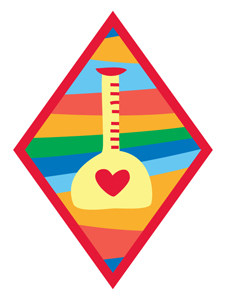Observation
Psychological Science Inspires New Merit Badge

Courtesy of Girl Scouts USA
Why earn a merit badge for nutrition when you could earn a badge for psychological science?
For the first time in over 25 years, Girl Scout badges are getting overhauled. Scouts can still earn traditional badges like the Cook or the Athlete, but now they can also earn a badge called the Science of Happiness.
The badge was the result of a collaboration between APS Fellow Martin Seligman, a researcher from the University of Pennslyvania known for his work on positive emotion, and Girl Scouts USA. To earn the badge, girls form a strategy for increasing their personal happiness, and then they test that strategy over a period of one month. The girls are encouraged to use a scientific mindset to evaluate their own psychological well-being throughout that period and to investigate the emotions of other people. According to Seligman, the requirements for the badge are based on the research underlying his books Authentic Happiness and Flourish.
Overall, APS is very encouraged by this merit badge trend. We hope to see future psychological science badges such as the Marshmallow Resister badge, the Stroop Master badge, the Huge NIH Grant badge, or the Cognitive Dissonance badge.
Share your ideas for psychological science badges in the Comments Section!
Why earn a merit badge for nutrition when you could earn a badge for psychological science?
For the first time in over 25 years, Girl Scout badges are getting overhauled. Scouts can still earn traditional badges like the Cook or the Athlete, but now they can also earn a badge called the Science of Happiness.
The badge was the result of a collaboration between APS Member Martin Seligman and Allison Niehaus at Girl Scouts USA. Seligman,
Why earn a merit badge for nutrition when you could earn a badge for psychological science?
For the first time in over 25 years, Girl Scout badges are getting overhauled. Scouts can still earn traditional badges like the Cook or the Athlete, but now they can also earn a badge called the Science of Happiness.
The badge was the result of a collaboration between APS Member Martin Seligman and Allison Niehaus at Girl Scouts USA. Seligman, a researcher from the University of Pennsylvania, is best known for his work on positive emotion.
To earn the badge, girls form a strategy for increasing their personal happiness, and then they test that strategy over a period of one month. The girls are encouraged to use a scientific mindset to evaluate their own psychological well-being throughout that period and to investigate the emotions of other people. According to Seligman, the requirements for the badge are based on the research underlying his books Authentic Happiness and Flourish.
Overall, APS would like to encourage this merit badge trend. We hope to see future psychological science badges such as the Exploring Visual Perception badge, the Heuristics badge, or the Cognitive Dissonance badge.
a researcher from the University of Pennsylvania, is best known for his work on positive emotion.
To earn the badge, girls form a strategy for increasing their personal happiness, and then they test that strategy over a period of one month. The girls are encouraged to use a scientific mindset to evaluate their own psychological well-being throughout that period and to investigate the emotions of other people. According to Seligman, the requirements for the badge are based on the research underlying his books Authentic Happiness and Flourish.
Overall, APS would like to encourage this merit badge trend. We hope to see future psychological science badges such as the Exploring Visual Perception badge, the Heuristics badge, or the Cognitive Dissonance badge.





APS regularly opens certain online articles for discussion on our website. Effective February 2021, you must be a logged-in APS member to post comments. By posting a comment, you agree to our Community Guidelines and the display of your profile information, including your name and affiliation. Any opinions, findings, conclusions, or recommendations present in article comments are those of the writers and do not necessarily reflect the views of APS or the article’s author. For more information, please see our Community Guidelines.
Please login with your APS account to comment.